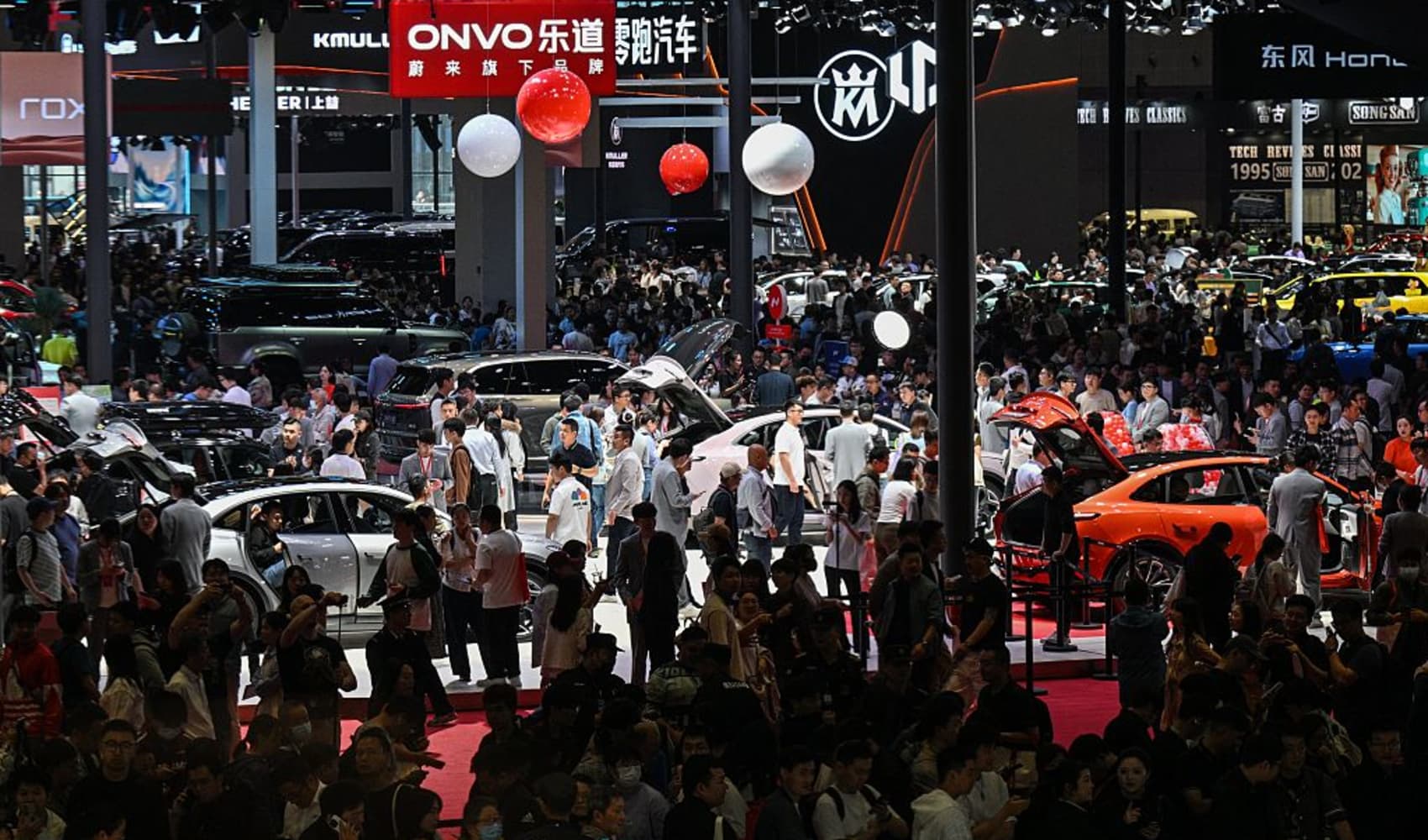China Tech Boom: CNBC's Inside Look at the AI Surge
China Tech Surge: Inside CNBC's "The China Connection" Newsletter
Introduction: Riding the Wave of China's Tech Boom
Feeling a tremor in the tech world? It might be the ground shaking beneath the weight of China's rapid technological advancements. As highlighted in CNBC's "The China Connection" newsletter, a significant tech boom is underway in the world's second-largest economy. From groundbreaking AI models to head-turning innovations at the latest auto shows, Chinese tech companies are churning out developments at an astonishing pace. But what's fueling this incredible surge, and what does it mean for the rest of the world? Let's dive in!
Generative AI: The Spark Igniting the Fire
Generative AI is no longer just a buzzword; it's a driving force behind China's tech explosion. Think about it: the ability to create new content, from text and images to code and simulations, is revolutionizing industries across the board. Chinese companies are rapidly developing and deploying generative AI models, powering everything from creative marketing campaigns to cutting-edge research and development.
How Generative AI is Shaping China's Tech Landscape
Generative AI is being used to optimize manufacturing processes, personalize customer experiences, and even accelerate drug discovery. It's a powerful tool that is helping Chinese companies innovate faster and more efficiently. Are we witnessing the dawn of a new era of creativity and problem-solving, powered by AI, in China?
Supportive Policy: The Wind Beneath the Wings
Tech booms don't just happen; they're often nurtured by supportive government policies. In China, the government has made it clear that it sees technological innovation as a key driver of economic growth. This commitment is reflected in policies that incentivize research and development, attract talent, and foster a favorable business environment.
Government Initiatives: Fueling the Innovation Engine
From tax breaks to subsidies to strategic investments, the Chinese government is actively supporting the growth of the tech sector. This proactive approach provides companies with the resources and confidence they need to take risks and push the boundaries of what's possible. Imagine a garden where the government acts as the diligent gardener, providing the water and fertilizer that allows innovation to bloom.
Investment Surge: Where the Money is Flowing
Where there's smoke, there's fire, and where there's a tech boom, there's usually a surge in investment. According to Tim Wang, co-founder of Monolith Management, "We're seeing a significant acceleration in AI investment in China." This influx of capital is providing companies with the resources they need to scale up their operations, expand their product offerings, and compete on the global stage.
Monolith Management's Perspective: A $400 Million Vote of Confidence
Monolith Management's $400 million public equity fund is a testament to the growing confidence in China's tech sector. This investment is not just about financial returns; it's about recognizing the potential of Chinese companies to shape the future of technology. Is this just the beginning of a wave of investment in China's tech sector?
The Auto Industry: A Showcase of Tech Prowess
The world's largest auto show provides a perfect stage for Chinese tech companies to showcase their latest innovations. From electric vehicles (EVs) with cutting-edge battery technology to autonomous driving systems that promise to revolutionize transportation, Chinese automakers are making a bold statement about their technological capabilities. They are not just building cars; they are building the future of mobility.
Electric Vehicles: Leading the Charge
China is already the world's largest market for EVs, and Chinese automakers are leading the charge in developing new and innovative electric vehicles. They are investing heavily in battery technology, charging infrastructure, and autonomous driving systems, positioning themselves as key players in the global EV market. Think of it as a race to the future, and Chinese companies are in the lead pack.
Artificial Intelligence: Beyond Generative Models
While generative AI is grabbing headlines, China's advancements in artificial intelligence extend far beyond this specific area. Chinese companies are also making significant progress in areas such as computer vision, natural language processing, and robotics.
Applications Across Industries: AI's Pervasive Influence
AI is being applied across a wide range of industries in China, from healthcare to finance to agriculture. It's helping companies improve efficiency, reduce costs, and develop new products and services. Imagine AI as a versatile tool that is being used to solve a wide range of problems and improve the lives of millions of people in China.
The Entrepreneurial Spirit: Driving Innovation
Behind every tech boom is a vibrant ecosystem of entrepreneurs who are willing to take risks and pursue their dreams. China has a large and growing population of entrepreneurs who are eager to build the next big thing.
Incubators and Accelerators: Nurturing Startups
China is home to a thriving network of incubators and accelerators that provide startups with the resources and support they need to succeed. These organizations play a crucial role in fostering innovation and helping startups scale up their operations. Think of them as greenhouses where promising startups are nurtured and given the opportunity to flourish.
Challenges and Opportunities: Navigating the Landscape
While China's tech sector is booming, it also faces a number of challenges. These include competition from established tech giants, concerns about data privacy, and regulatory uncertainty.
Balancing Growth and Regulation: A Delicate Dance
The Chinese government faces the challenge of balancing the need to promote innovation with the need to regulate the tech sector and protect consumers. This is a delicate dance that requires careful consideration and a willingness to adapt to changing circumstances. Can China strike the right balance and continue to foster innovation while addressing these challenges?
Global Implications: A World Transformed
China's tech boom is not just a domestic phenomenon; it has significant implications for the rest of the world. Chinese companies are increasingly competing with established tech giants in global markets, and they are also investing heavily in research and development, which could lead to breakthroughs that benefit the entire world.
Competition and Collaboration: A New Global Order
The rise of China's tech sector is creating both opportunities and challenges for companies around the world. It's forcing them to become more competitive and innovative, but it's also creating opportunities for collaboration and partnership. Are we entering a new era of global competition and collaboration, driven by technological innovation?
Beyond the Hype: Real-World Impact
It's easy to get caught up in the hype surrounding China's tech boom, but it's important to remember that behind the headlines are real people and real businesses that are being transformed by technology.
Improving Lives: Technology's Transformative Power
From mobile payments to online education to telemedicine, technology is improving the lives of millions of people in China. It's making it easier for them to access goods and services, connect with others, and pursue their dreams. Think of it as a rising tide that is lifting all boats, creating new opportunities for everyone.
The Future of China's Tech: A Glimpse into Tomorrow
What does the future hold for China's tech sector? While it's impossible to predict the future with certainty, there are a few trends that are likely to shape the landscape in the years to come.
Continued Innovation: The Engine of Growth
China's tech sector is likely to continue to innovate at a rapid pace, driven by factors such as government support, a large and growing talent pool, and a vibrant entrepreneurial ecosystem. The pace of innovation is unlikely to slow down anytime soon. In fact, we may see even more breakthroughs in the years to come, potentially rewriting the rules of the tech world as we know them.
Conclusion: Key Takeaways from China's Tech Boom
China's tech boom is a powerful force that is transforming the global landscape. Fueled by generative AI, supportive government policies, and a surge in investment, Chinese tech companies are rapidly innovating and competing on the world stage. While challenges remain, the opportunities are immense, and the potential for further growth is significant. So, buckle up and get ready for the ride – the Chinese tech revolution is only just beginning!
Frequently Asked Questions (FAQs)
- What is driving the tech boom in China?
- The tech boom is primarily driven by advancements in generative AI, supportive government policies, and a surge in investment, creating a favorable environment for innovation and growth.
- How is the Chinese government supporting the tech sector?
- The government provides support through policies that incentivize research and development, attract talent, foster a favorable business environment, and offer tax breaks and subsidies.
- What role does generative AI play in China's tech surge?
- Generative AI is a key driver, enabling companies to create new content, optimize processes, personalize customer experiences, and accelerate research across various industries.
- What are some challenges facing China's tech sector?
- Some challenges include competition from established tech giants, concerns about data privacy, and regulatory uncertainty, requiring a balance between growth and regulation.
- What are the global implications of China's tech boom?
- China's tech boom leads to increased competition in global markets, potential breakthroughs benefiting the world, and opportunities for collaboration and partnership on a global scale.

